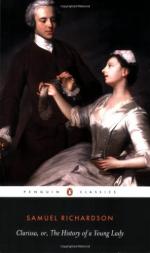|
This section contains 4,993 words (approx. 17 pages at 300 words per page) |

|
SOURCE: "Truth and Storytelling in Clarissa," in Samuel Richardson: Tercentary Essays, edited by Margaret Anne Doody and Peter Sabor, Cambridge University Press, 1989, pp. 40-50.
In the following essay, Dussinger discusses truth and the semblance of truth in Clarissa's letters, and explains why Clarissa's attempts at sincerity cannot succeed.
A character who prefers death to a life not on her own terms may speak without guile. Partly owing to her reputation as Christian martyr, Clarissa, who could summon even Fielding's tears, has usually appeared free of the mendacity associated with Pamela's account of herself.1 Yet despite this character's own frenetic assurances of intentional purity, Dr Johnson observed shrewdly that 'there is always something which she [Clarissa] prefers to truth'2 and thus addressed the central epistemological dilemma while leaving open the question of whether her penchant for untruth is wilful or not.
To a large extent the question is unanswerable...
|
This section contains 4,993 words (approx. 17 pages at 300 words per page) |

|


